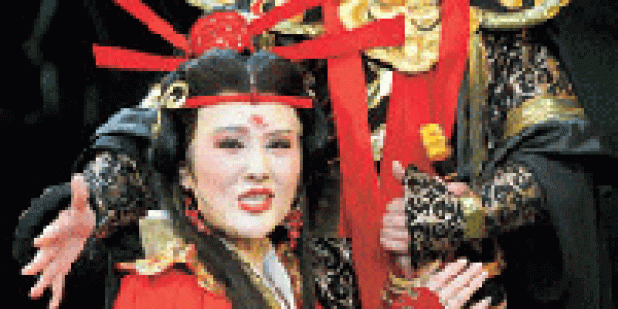Join us for a free one-day workshop for educators at the Japanese American National Museum, hosted by the USC U.S.-China Institute and the National Consortium for Teaching about Asia. This workshop will include a guided tour of the beloved exhibition Common Ground: The Heart of Community, slated to close permanently in January 2025. Following the tour, learn strategies for engaging students in the primary source artifacts, images, and documents found in JANM’s vast collection and discover classroom-ready resources to support teaching and learning about the Japanese American experience.
CANCELLED: Mei Lanfang Beijing Opera Troupe Performance
The star-studded troupe performs at CSUN

Ticket Information: 818 677-2488
CSUN Students: $5
General Public: $20
Mei Lanfang Beijing Opera Troupe: An Introduction
The star-studded Mei Lanfang Beijing Opera Troupe is the only national class performing group named after an individual in China. The troupe was established in 1922 by the Beijing Opera legend Mei Lanfang, who was the first to introduce Beijing Opera to the rest of the world. During Mei’s stage life, he embellished the traditions of the past with his own creations, shaping a style of his own and giving birth to "The Mei Lanfang School". With a history of more than 80 years, and with an array of National Class performers and award-winners, including Hu Wenge, Li Hongtu, and Dong Yuanyuan, the troupe has successfully toured the, the United Kingdom, Italy, Japan, Russia and Canada to critical acclaim. This will be the troupe’s first time performing in the United States since Master Mei Lanfang’s visit in 1930.
Mei Baojiu, the youngest son of Mei Lanfang, is a National Class performer and the Director of Mei Lanfang Beijing Opera Troupe. He was trained in the art by his father and other famous artists at a very young age. A gifted artist endowed with a clear, sweet voice, Mei has excellent delivery, easy control over his vocal techniques and an elegant stage persona that resembles his father's style. His exceptional style is the very essence of the Mei Lanfang School, of which he is considered the most representative star. He was presented with the "Asia's Best Artist Award" by the New York Lincoln Center. Mei Baojiu will be performing this coming October at the first annual “Chinese Cultural and Performing Arts Festival” held in Los Angeles and San Francisco.
Synopses of Beijing Opera Pieces to Be Performed at CSUN:
1. Havoc in Heaven
In the famous Chinese classical novel,"Journey to the West", the Monkey King, Sun Wukong, was conferred the title, "Qi Tian Da Sheng,"meaning “great saint, equal to god,” by the Divine Palace in Heaven. One day when he found out that he was not invited to the Divine Peaches Banquet, which was held by Wang Mu (Queen of the Divine Palace), he was very upset with anger. He stole the immortal peaches and elixir pills, and returned to Mountain Huaguo, his native hometown on earth. Yu Di (Emperor of the Divine Palace) dispatched some troops to catch the Monkey King, but they were utterly defeated by him.
2. Picking Up the Jade Bracelet
The story took place in Ming Dynasty (1368 - 1644) A young scholar named Fu Peng fell in love with Sun Yujiao, a young and beautiful girl. He intentionally dropped a jade bracelet in front of Sun's house. Sun picked it up as a present from her lover. An old matchmaker named Liu saw this and asked for an embroidered shoe as a love token. She promised to be the matchmaker for them.
3. The Stealing of the Immortal Reishi Mushroom
"The Stealing of the Immortal Reishi Mushroom"is an episode from "The Tale of White Snake". On one Dragon Boat Festival, Xu Xian persuaded his wife, Bai Suzhen to drink the realgar liquor. Bai Suzhen turned into her original form, a white snake after she drank the realgar liquor. Facing the snake, Xu Xian was shocked to death. In order to resurrect her husband, Bai Suzhen went to the mountain which has the immortal Reishi mushroom. There she fought against the guards, crane and deer. Finally she got the Reishi mushroom and saved her husband Xu Xian’s life.
4. Farewell My Concubine
Liu Bang and Xiang Yu had signed a contract to cease hostilities along Honggou. Han Xin, Liu Bang’s general, ordered Li Zuoche to pretend surrendering to Xiang Yu so as to lure Xiang’s troop into a deep trap. Meanwhile, Han Xin ambuscaded in Mountain Jiuli and trapped all Xiang’s troop at Gaixia. Xiang Yu couldn’t break through the besiegement. Xiang Yu and his soldiers heard their native people’s songs outside, therefore believed that other soldiers from their country had all surrendered. The songs were actually sung by Han’s soldiers as a trick. In despair, Xiang Yu realized that he had been defeated. He drank with his beautiful concubine, Princess Yu. Princess Yu performed a farewell dance for Xiang Yu, then committed suicide with her swords.
Featured Articles
Please join us for the Grad Mixer! Hosted by USC Annenberg Office of International Affairs, Enjoy food, drink and conversation with fellow students across USC Annenberg. Graduate students from any field are welcome to join, so it is a great opportunity to meet fellow students with IR/foreign policy-related research topics and interests.
RSVP link: https://forms.gle/1zer188RE9dCS6Ho6
Events
Hosted by USC Annenberg Office of International Affairs, enjoy food, drink and conversation with fellow international students.
Join us for an in-person conversation on Thursday, November 7th at 4pm with author David M. Lampton as he discusses his new book, Living U.S.-China Relations: From Cold War to Cold War. The book examines the history of U.S.-China relations across eight U.S. presidential administrations.




